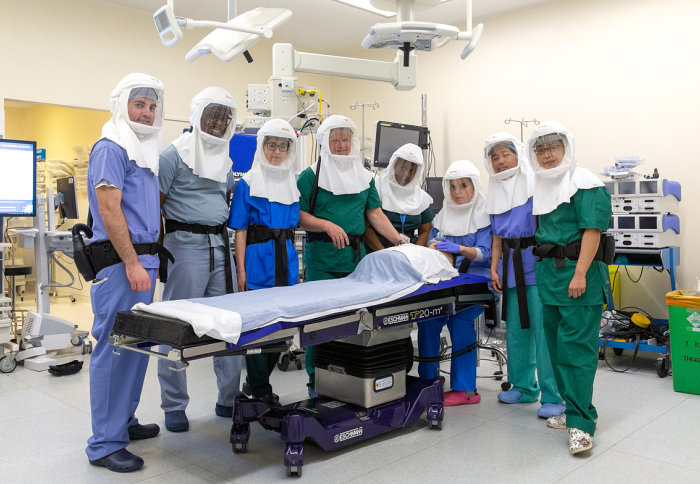Advanced respirators help surgeons treat coronavirus patients

A team of Imperial chemical engineers have sourced and developed respirator equipment to protect surgeons while they operate on coronavirus patients.
The reusable personal protective equipment, known as powered air-purifying respirators (PAPRs), is a personal respirator that filters the air, to remove hazardous fine particles, such as those from COVID-19.
The COVID-19 virus is approximately 60-140 nm in diameter, although it may be spread via aerosol particles less than 1 micron in size, which poses significant risk to surgeons and healthcare staff during operations.
The PAPR system is combined with a protective hood, which covers the wearer’s face, eyes, skin, and neck, to prevent contamination of infectious aerosol particles. It offers surgeons a good field of vision and can allow medical staff to breathe clean, filtered air for up to eight to nine hours.
The equipment has been successfully used by medics in dozens of operations at Imperial College Healthcare NHS Trust hospitals and enabled them to operate more safely.

It has proved particularly useful for medics during throat surgeries, such as tracheostomies, where they are at greater risk of catching the virus due to the nature of the operation.
The coronavirus infection has caused many patients to be admitted to intensive care as a consequence of viral pneumonia and respiratory distress syndrome.
Many of these patients require tracheostomies - where a tube is placed into the patient’s trachea or windpipe. Early reports from the pandemic revealed that the surgeons were susceptible to contracting the infection during these operations.
Professor Neil Tolley who leads the team of surgeons in the Ear, Nose and Throat (ENT) division at Imperial College NHS hospitals, sought assistance from Professor Nilay Shah, Head of the Department of Chemical Engineering, for advice on a form of enhanced PPE through reusable personal protective equipment.
Engineering ingenuity

The project was initiated in mid of March and coordinated by Dr Qilei Song, Lecturer in the Department of Chemical Engineering, who said: “The coronavirus disease pandemic is the greatest global healthcare challenge and frontline healthcare workers are still risking their health and lives to fight against the coronavirus and save patients.
“We’ve brought together expertise from scientists, engineers, medical staff and industry from the UK and China, to develop this system to protect front line healthcare workers while they treat patients.”
Professor Nilay Shah, Head of the Department of Chemical Engineering, has been leading the department’s efforts to supply hand sanitisers and PPE to frontline medical staff.
Professor Shah said: “We are proud to apply our chemical engineering knowledge and offer our support to protect frontline medical staff so they can save more lives.”
Minimising the risk of infection for frontline medics

Professor Neil Tolley, who leads the team of surgeons in the Ear, Nose and Throat (ENT) division at Imperial College NHS hospitals, said: “The PAPR’s have been a ‘game changer' as they have facilitated a change in the management of ENT emergencies and have permitted us to recommence airway and emergency surgery to pre-COVID principles, and ultimately minimised risk for medical staff permitting us to perform more potentially high risk procedures."
Dr Song sourced the TECMEN PAPRs with P3-level high efficiency particulate air (HEPA) filter from a UK distributor, Weldfast UK, and tested the prototypes with Professor Tolley’s team.
Dr Song also contacted the manufacturer of the PAPRs in China, TECMEN electronics, which donated more than 10 sets of upgraded TECMEN TM-H2 PAPR systems and reusable hoods.
The TECMEN TM-H2 PAPR devices have been certified to European standards (EN 12941) and have been further tested by NHS hospitals and meet required standards for use in UK clinical settings.
The hood benefits from no uncomfortable tight-fitting seals on or around the face, which makes it particularly suitable for racial, ethnic or religious groups that cannot shave facial hair or fail the FFP3 mask fit test.

The team have now sourced more than 100 sets of PAPRs, which are shared between ICU and ear, nose and throat surgical teams, and anaesthetic teams at Imperial College NHS Trust Healthcare Hospitals and other hospitals in London.
Dr Song’s team are now working with the NHS to establish supply chains so that other NHS Trusts can procure the equipment.
Professor Tolley has been sharing their early experiences with the broader clinical communities in Europe and worldwide through a Global Tracheostomy collaborative Webinar.
Chinese collaboration
Dr Song and colleagues at Imperial, including Dr Rongjun Chen from the Department of Chemical Engineering and Professor Daqing Ma, from the Department of Surgery & Cancer, also contacted frontline doctors in Wuhan, China who have been sharing their clinical experiences and knowledge with the hospital staff, as well as experiences of using this equipment. With the support of many Chinese students, they collected feedback on practices on COVID-19 treatment published by Chinese professional societies and journals.
Medics from Imperial College NHS Healthcare Trust also collaborated with doctors in Chinese hospitals and held an online workshop to discuss best-practice and establish a step-by-step for safely using and re-using the equipment.
Want to study with us?
Find out more on our Department of Chemical Engineering page.
Article text (excluding photos or graphics) © Imperial College London.
Photos and graphics subject to third party copyright used with permission or © Imperial College London.
Reporter
Stephen Johns
Communications Division
Thomas Angus [Photographer]
Communications Division
